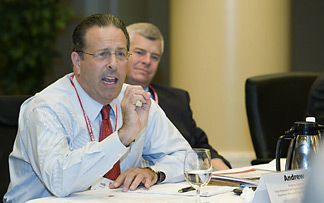Hotel roundtable reveals that when it comes to human resources, one size does not fit all
By Glenn Withiam

Companies use very different ways to determine and carry out their human resources priorities, concluded senior executives, faculty and students attending the third Human Resources Roundtable at Cornell's School of Hotel Administration, Sept. 28-29 on the Ithaca campus.
Sponsored by the Cornell Center for Hospitality Research, eCornell and Cornell's School of Industrial and Labor Relations, the goal of the roundtable series is to connect industry leaders with Cornell's faculty and students and to crystallize the key issues facing the industry's human resources professionals.
"I was particularly struck by the variability in the approaches used by our industry participants," said Bruce Tracey, associate professor of organizational management, communication and law, who organized the roundtable. "Training and outsourcing, for example, drew considerable involvement and debate. What we found as those discussions unfolded was that each company was using a model that fit its own particular business strategy and competitive needs. As such, there was no silver bullet for any of the issues we covered."
Tracey added that the companies even had different ways of determining their human resources (HR) priorities. "Some companies were focused on demonstrating that their HR practices provided clear and convincing value for their company, complete with forecasting and rigorous program evaluation," Tracey explained. "Others took a more philosophical approach and simply focused on what they thought was right for their firm. However, all participants were pushing to think differently about their current and future HR needs."
At the roundtable, Cornell faculty members presented recent research studies, including research on training and compensation practices, and hotel school students participated in the sessions.
The discussion on training, for example, began with research that examined the utility of various proactive efforts that were designed to help employees transfer what they learned to their jobs. The ensuing discussion revealed that firms focused on a wide array of both formal and informal activities that improve training effectiveness -- from enhancing managerial involvement throughout the training process to making jobs more flexible so that employees have the opportunity to use what they have learned.
More than a dozen industry participants attended, including executives from Uno Restaurants, Starwood Hotels and Resorts, ARAMARK, Smith Travel Research, Mövenpick, Loews Corp., Four Seasons Hotels and Resorts, American Food and Vending Corp., and ClubCorp.
For more information about future roundtables at the Cornell Hotel School, see http://www.hotelschool.cornell.edu/chr/news/roundtables.html.
Media Contact
Get Cornell news delivered right to your inbox.
Subscribe